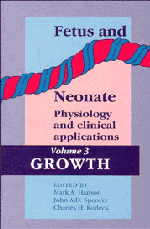Preface to the series
Published online by Cambridge University Press: 04 August 2010
Summary
The factual burden of a science varies inversely with its degree of maturity P. Medawar ‘Two Conceptions of Science’: ‘Anglo-Saxon Attitudes’,
Henry Tizard Memorial Lecture, Encounter 143, August 1965The idea for a series on the applications of fetal and neonatal physiology to clinical medicine came from the need of our students for something intermediate between a textbook and review articles. Textbooks provide breadth of coverage but tend to lack critical discussion. Reviews can provide such discussion but represent the view of one authority and may need a balance. For the student, such reviews are not a substitute for original papers and are better taken after consumption of a full course of such papers rather than as hors d'oeuvres to them.
We envisage the readership of the series as ‘students’ of the subject in the widest sense, from undergraduates learning about fetal and neonatal physiology as part of a basic science degree or preclinical medical students, to postgraduate and postdoctoral scientists and clinicians specializing in obstetrics, neonatology or paediatrics. We decided that all needs would best be met by producing a series of multiauthored volumes. This will allow rapid production of short texts that will keep the material focused whilst still allowing the subject to be reviewed from several points of view. None the less, we have decided to adopt a ‘systems’ approach because it has the advantages of simplicity and conformity to textbooks of physiology.
- Type
- Chapter
- Information
- Publisher: Cambridge University PressPrint publication year: 1995



